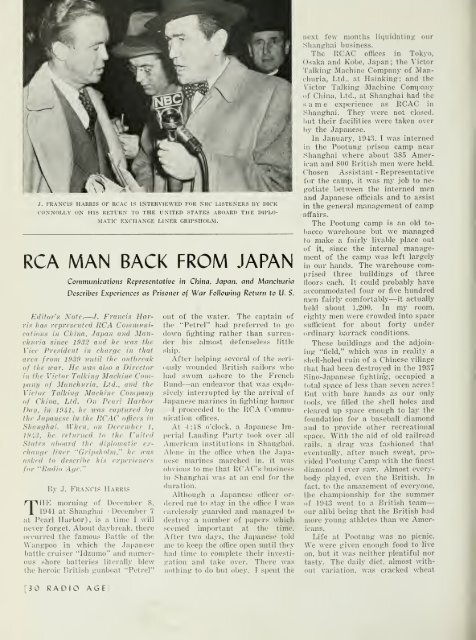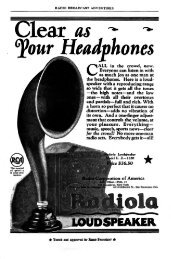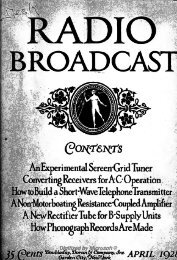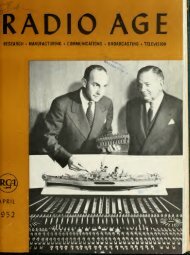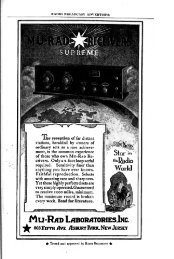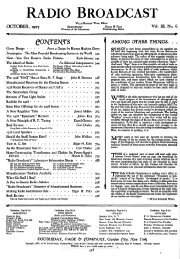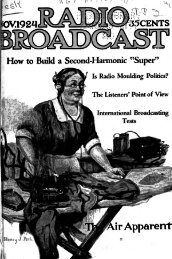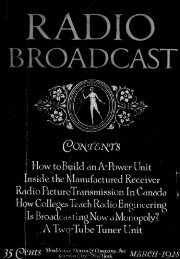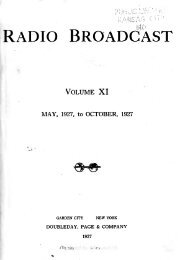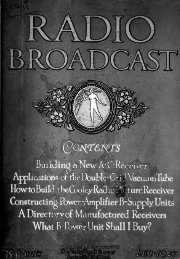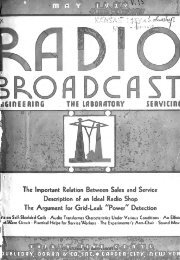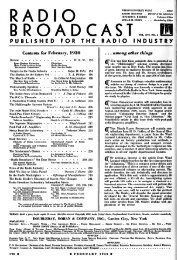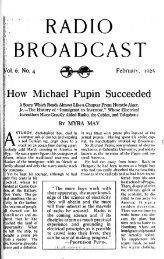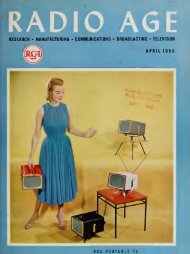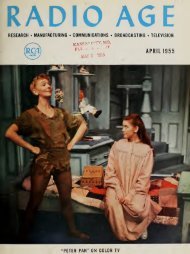Radio Age - 1944, January - 36 Pages, 3.3 MB ... - VacuumTubeEra
Radio Age - 1944, January - 36 Pages, 3.3 MB ... - VacuumTubeEra
Radio Age - 1944, January - 36 Pages, 3.3 MB ... - VacuumTubeEra
Create successful ePaper yourself
Turn your PDF publications into a flip-book with our unique Google optimized e-Paper software.
I hat<br />
J. FRANCIS HARRIS OF RCAC IS INTERVIEWED FOR NBC LISTENERS BY DICK<br />
CONNOLLY ON HIS RETURN TO THE UNITED STATES ABOARD THE DIPLO-<br />
MATIC EXCHANGE LINER GRIPSHOLM.<br />
RCA MAN BACK FROM JAPAN<br />
Communications Representative in China. Japan, and Mcincliuria<br />
Describes Experiences as Prisoner of War Following Return to U. S.<br />
Editor's Note.— J. Francis Harris<br />
has represented RCA Communications<br />
in China, Japan and Manchuria<br />
since 1932 and he was the<br />
Vice President in charge in that<br />
area from 1939 until the outbreak<br />
of the war. He was also a Director<br />
in the Victor Talking Machine Company<br />
of Manchitria, Ltd., and the<br />
Victor Talking Machine Company<br />
of China, Ltd. On Pearl Harbor<br />
Dan, in 19il, he was captured by<br />
the .Japanese in the RCAC offices in<br />
Shanghai. When, on December 1.<br />
19Ji3, he returned to the United<br />
States aboard the diploinatic exchange<br />
liner "Gripsholm," he ivas<br />
asked to describe his experiences<br />
for "<strong>Radio</strong> <strong>Age</strong>."<br />
THK<br />
By J.<br />
Francis Harris<br />
morninjj: of December 8,<br />
l'J41 at Shanghai (December 7<br />
at Pearl Harbor), is a time I will<br />
never forget. About daybreak, there<br />
occurred the famous Battle of the<br />
Wangpoo in which the Japanese<br />
battle cruiser "Idzumo" and numerous<br />
shore batteries literally blew<br />
the heroic British gunboat "Petrel"<br />
out of the water. The captain of<br />
the "Petrel" had preferred to go<br />
down fighting rather than surrender<br />
his almost defenseless little<br />
ship.<br />
After helping several of the seriously<br />
wounded British sailors who<br />
had swum ashore to the French<br />
Bund—an endeavor that was explosively<br />
interrupted by the arrival of<br />
Japanese marines in fighting humor<br />
— I proceeded to the RCA Communication<br />
offices.<br />
.\t 1:18 o'clock, a Japanese Imperial<br />
Landing Party took over all<br />
American institutions in Shanghai.<br />
Alone in the office when the Japanese<br />
marines marched in, it was<br />
obvious to me that RCAC's business<br />
in Shangliai was at an end for the<br />
duration.<br />
Although a Japanese officer ordered<br />
me to stay in the office 1 was<br />
carelessly guarded and managed to<br />
destroy a number of papers which<br />
seemed important at the time.<br />
After two days, the Japanese told<br />
me to keep the office open until they<br />
had time to complete their investigation<br />
and take over. There was<br />
nothing to do but obey. I spent the<br />
next few months liquidating our<br />
Shanghai business.<br />
The RCAC offices in Tokyo,<br />
()s;ika<br />
and Kobe, Japan; the Victor<br />
Talking Machine Company of Manrhuria,<br />
Ltd., at Hsinking; and the<br />
\'ictor Talking Machine Company<br />
of China, Ltd., at Shanghai had the<br />
same experience as RCAC in<br />
Shanghai. They Avere not closed,<br />
l)ut their facilities were taken over<br />
by the Japanese.<br />
In <strong>January</strong>. 1943, I was interned<br />
in the Pootung prison camp near<br />
Shanghai where about 385 American<br />
and 800 British men were held.<br />
Chosen Assistant - Representative<br />
for the camp, it was my job to negotiate<br />
between the interned men<br />
and Japanese officials and to assist<br />
in the general management of camp<br />
affairs.<br />
The Pootung camp is an old to-<br />
Ijacco warehouse but we managed<br />
to make a fairly livable place out<br />
of it, since the internal management<br />
of the camp was left largely<br />
ill our hands. The warehouse comprised<br />
three buildings of three<br />
lloors each. It could probably have<br />
accommodated four or five hundred<br />
men fairly comfortably— it actually<br />
held about 1,200. In my room,<br />
eighty men were crowded into space<br />
sufficient for about forty under<br />
ordinary barrack conditions.<br />
These buildings and the adjoining<br />
"field," which was in reality a<br />
shell-holed ruin of a Chinese village<br />
had been destroyed in the 1937<br />
Sino-Japanese fighting, occupied a<br />
total space of less than seven acres!<br />
lUit with bare hands as our only<br />
tools, we filled the shell holes and<br />
cleared up space enough to lay the<br />
foundation for a baseball diamond<br />
and to provide other recreational<br />
space. With the aid of old railroad<br />
rails, a drag was fashioned that<br />
eventually, after much sweat, pro-<br />
\ided Pootung Camp with the finest<br />
diamond I ever saw. Almost everyliody<br />
played, even the British. In<br />
fact, to the amazement of everyone,<br />
the championship for the summer<br />
of 19-13 went to a British team<br />
our alibi being that the British had<br />
more young athletes than we Americans.<br />
Life at Pootung was no picnic.<br />
We were given enough food to live<br />
on, but it was neither plentiful nor<br />
tasty. The daily diet, almost without<br />
variation, was cracked wheat<br />
[3 RADIO AGE


